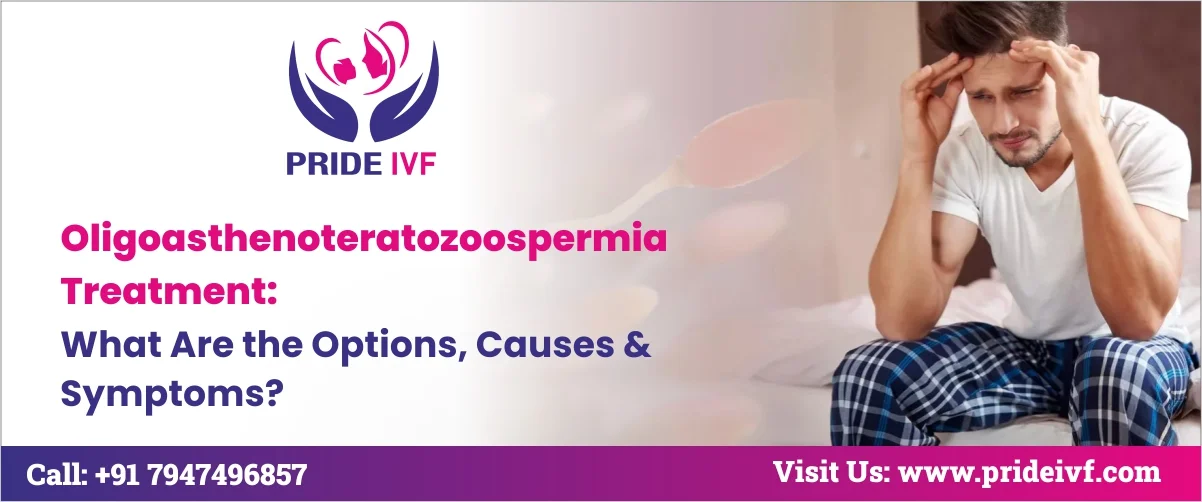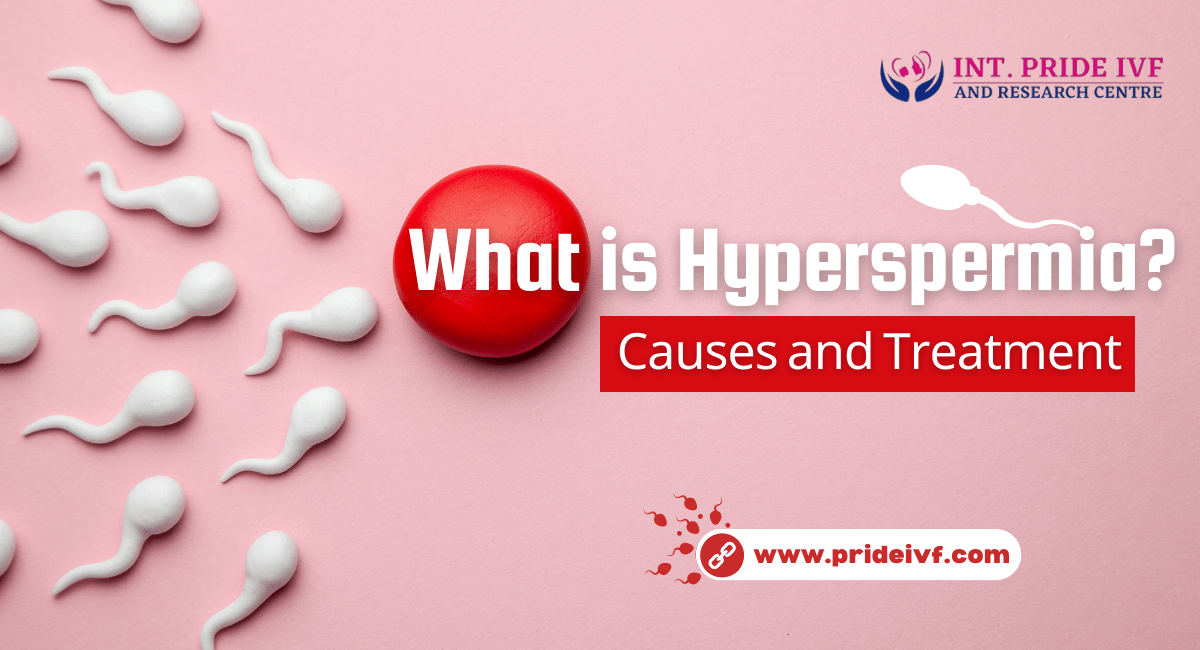Our devoted team of fertility professionals is committed to providing couples with individualized and successful oligoasthenoteratozoospermia treatment options. At Pride IVF, we try to make every couple’s path towards parenting easier and more rewarding.




What is Oligoasthenoteratozoospermia?
Infertility means the inability of a couple to conceive even after regular and unprotected intercourse for a year.
One of the several male infertility types is the condition oligoasthenoteratozoospermia which means having a low sperm count, reduced sperm motility (asthenospermia), abnormal sperm shape or aberrant sperm morphology (teratospermia) or a combination of all of these.
Because of this condition, it may be necessary to use assisted reproductive methods such as intrauterine insemination (IUI) or in vitro fertilization (IVF) with intracytoplasmic sperm injection (ICSI) in order to conceive.
The majority of male infertility cases are caused by oligoasthenoteratozoospermia, which is rather frequent. Hormonal imbalances, genetic anomalies, lifestyle decisions, and certain medical disorders are just a few of the causes.
Male infertility, particularly OAT, can have a negative emotional and psychological impact on couples. It can result in stress, worry, and feelings of inadequacy as the wish to get pregnant and create a family remains unfulfilled.
However, thanks to developments in reproductive medicine and the assistance of a specialized fertility clinic like Pride IVF, many couples may now overcome male infertility and realize their parental aspirations.
What Is Severe Oligoasthenoteratozoospermia?
A more severe kind of male infertility known as severe oligoasthenoteratozoospermia is characterized by defective sperm morphology, a relatively low sperm count, and poor sperm motility. The amount of sperm is significantly decreased in the condition, and the few sperm that are still there may not travel properly or have unusual forms.
Couples seeking to conceive naturally face considerable obstacles due to severe oligoasthenoteratozoospermia since the likelihood of fertilization is drastically decreased.
Couples dealing with severe OAT, however, have hope owing to improvements in assisted reproductive technologies like intracytoplasmic sperm injection (ICSI). ICSI eliminates the necessity for sperm motility by simply inserting one healthy sperm into the egg.
A complete semen analysis (Also Read: Semen analysis test cost) and a thorough review by a fertility expert are required for the diagnosis of severe OAT. The underlying causes of the problem will affect the available treatments. Pride IVF’s fertility specialists provide couples with the chance to realize their goal of parenthood by addressing severe OAT with individualized care and cutting-edge therapies.
Pride IVF takes pride in offering advanced treatment options for male infertility including oligoasthenoteratozoospermia (OAT), a complex male infertility condition.
Symptoms of Oligoasthenoteratozoospermia
The complicated male infertility disorder known as oligoasthenoteratozoospermia (OAT) affects sperm motility, morphology, and count. The following are examples of OAT symptoms that may be brought on by faulty sperm parameters:
- Low Sperm Count (Oligospermia): OAT decreases sperm count, which indicates that there is less sperm in the semen sample than expected under normal circumstances.
- Lack of Sperm Motility (Asthenospermia): Sperm motility is the sperm’s capacity to advance and contact the egg. Sperm may move slowly or poorly in OAT, making it challenging to get to the egg and fertilize it.
- Atypical Sperm Morphology (Teratospermia): Sperm in OAT frequently have an irregular form and structure, which impairs their capacity to fertilize the egg.
- Difficulty In Conceiving: OAT can drastically lower the likelihood of spontaneous fertilization, which makes conceiving difficult.
- Repeated Miscarriages: When OAT leads to pregnancy, there may be a higher chance of repeat miscarriages because of poor sperm quality.
If any of these symptoms are present, it is imperative to speak with a fertility specialist at Pride IVF since prompt diagnosis and oligoasthenoteratozoospermia treatment may dramatically increase a couple’s chances of conceiving a child successfully when they are dealing with OAT-related infertility.
Lets get started
Causes Of Oligoasthenoteratozoospermia
The complicated condition of oligoasthenoteratozoospermia (OAT), which affects sperm count, motility, and morphology, causes male infertility in men. OAT is caused by a number of causes and circumstances, including:
- Genetic Factors: Genetic anomalies that impact sperm growth and production can lead to OAT. Abnormal sperm parameters can result from genetic problems, chromosomal abnormalities, and gene mutations.
- Hormonal Imbalances: Hormones are important for the generation of sperm. Hormonal imbalances, such as low testosterone or high prolactin levels (prolactin test), can have a detrimental effect on sperm quality.
- Varicocele: A varicocele is a disorder that causes the veins in the scrotum to expand, which raises the temperature of the scrotum. This high temperature may have an impact on sperm motility and production.
- Infections: A number of illnesses, including STIs and UTIs, can harm the reproductive system and create inflammation, which can reduce sperm production.
- Environmental Factors: The exposure to environmental pollutants, radiation, and chemicals can have harmful effects on the production and quality of sperm.
- Lifestyle Habits: OAT can be exacerbated by unhealthy lifestyle choices including stress, excessive alcohol use, drug usage, and smoking.
- Medical Procedures: Some medical procedures, including chemotherapy and radiation therapy for cancer, may have a negative impact on sperm function and production.
- Medications: Some drugs, including antibiotics and steroids, can prevent the generation of sperm.
- Age: As sperm quality may deteriorate with age, increasing paternal age may potentially play a role in OAT.
It is essential to remember that the specific etiology of OAT may occasionally remain unknown and maybe a mix of many variables. To determine the precise causes of OAT and create an effective oligoasthenoteratozoospermia treatment strategy, a thorough assessment by a reproductive specialist is essential. For couples struggling with OAT-related infertility, addressing underlying reasons, altering one’s lifestyle, and taking advanced reproductive procedures into consideration can dramatically increase the likelihood of a successful pregnancy.
Oligoasthenoteratozoospermia Treatment at Pride IVF
For oligoasthenoteratozoospermia (OAT), a complicated disorder that impacts male fertility, Pride IVF provides comprehensive and individualized treatment options. Based on the underlying causes of OAT, our skilled team of reproductive specialists develops individualized treatment regimens in close collaboration with patients.
- Medications: To treat hormonal imbalances and enhance sperm production and quality, fertility drugs may be administered depending on the precise reasons discovered.
- Advanced assisted reproductive methods, such as intracytoplasmic sperm injection (ICSI), may be advised for severe cases of OAT. ICSI eliminates the necessity for sperm motility by inserting one healthy sperm right into the egg.
- Surgical procedures: In certain cases, correcting anatomical anomalies or blockages that lead to OAT may need surgical procedures.
- Lifestyle Changes: Leading a healthy lifestyle has a big effect on sperm health. To increase fertility, our doctors offer advice on food, exercise for infertility, and stress reduction.
- Oligoasthenoteratozoospermia Natural Treatment: In addition to standard therapies, we investigate all-natural methods to boost male fertility. This might involve dietary supplements and lifestyle modifications to improve reproductive health in general.
Our skilled team of fertility specialists determine the root causes of OAT and provide individualized treatment strategies through a thorough assessment and comprehensive diagnostic approach. Pride IVF is the best option for couples looking for efficient oligoasthenoteratozoospermia treatment, owing to our cutting-edge facilities, cutting-edge technology, intrauterine insemination (IUI), in vitro fertilization (IVF), and intracytoplasmic sperm injection (ICSI). We are dedicated to supporting couples through their reproductive journey and helping them realize their parental goal.




